Coornhert
Dirck Volckertszoon Coornhert (Amsterdam, 1522 - Gouda, 1590)
About his life
The 16th century was even more turbulent than the 17th. Armed struggle, iconoclastic and cruel punishments were the order of the day. Coomhert lived in the Warmoesstraat 111 near Dam Square in Amsterdam. 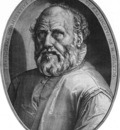 On Coomhert's 13th year (in 1535) at the Dam the rebellion of the Anabaptists took place. This was followed later by revolting executions also at the Dam, including of Anneken Hendriks, who was thrown into the fire with gunpowder in her mouth. Anabaptists saw the community property as the foundation of society. They opposed the baptism of newborn children, because they thought that the baptism had to be adopted voluntarily. They also opposed government intervention in religion. To make the equality of all people understandable, they demonstrated in their nakedness in the streets.
On Coomhert's 13th year (in 1535) at the Dam the rebellion of the Anabaptists took place. This was followed later by revolting executions also at the Dam, including of Anneken Hendriks, who was thrown into the fire with gunpowder in her mouth. Anabaptists saw the community property as the foundation of society. They opposed the baptism of newborn children, because they thought that the baptism had to be adopted voluntarily. They also opposed government intervention in religion. To make the equality of all people understandable, they demonstrated in their nakedness in the streets.

ANABAPTIST ANNEKEN HENDRIKS
This will have made a great impression on Coomhert. Perhaps it is an explanation for his lifelong struggle for freedom of speech and religion. For his opposition to the killing of heretics. And his commitment to penal reform with real results.
In Disciplining Villains ('Boeventucht') he puts his ideas on valuable ways of punishment. He advocated the preparation of a detainee to return to society. This has actually led to significant changes, as the prisoners were assigned tasks and activities. And the hitherto very cruel way of applying corporal punishment changed.
Translations
The biography by H. Bonger shows his versatility and talent. From professional graphic artist, he also translated from Latin 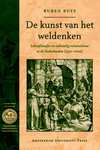 philosophical books including Cicero, the Stoics, Boëtthius and the Odysee. He owes much to these writers for his own philosophy. As secretary of Haarlem, he is in close contact with William of Orange at the time of the Union of Utrecht (1579) and the Declaration of Independence (The Act of Verlatinghe) in 1581.
philosophical books including Cicero, the Stoics, Boëtthius and the Odysee. He owes much to these writers for his own philosophy. As secretary of Haarlem, he is in close contact with William of Orange at the time of the Union of Utrecht (1579) and the Declaration of Independence (The Act of Verlatinghe) in 1581.
Active in those turbulent times, he knows to combine this with a 'spiritualist' inspiration. Bruno Becker, his biographer calls him the "Apostle of perfectibility'. As a rhetorician, a friend of the poet 'Spiegel' and at the end of its life a member of d'Egelantier, he first writes primarily from a Christian faith. Later increasingly also from a philosophy of nature. In his Ethics "Levenskonst dat is Wellevenskonste" the word God is no longer. Although he never left the Catholic Church, he dies under the protection of Gouda Collegiants.
Coomhert as a philosopher and poet

Key themes in Coomhert's work are 'perfectibility', the 'chief reason' and 'true science'. And 'the Golden Rule', which he puts in a naturalistic frame.
"Man is not conceived and born in sin, but in goodness. He is not predestined to eternal salvation or damnation, but he can, with Christ's grace, make himself perfect, even on Earth. This requires that he exercises the right and with free will sends his life for the better continually. Free will shall take the best decisions when it can call on a true and honest opinion. If the opinion is right, then the whole man is well. When is this the case? If the opinion is guided on the "chief cause" and the "true science".
"What you do not want done to yourself, don't do that to another" and vice versa, "treat one another like yourself want to be treated".
Coornhert a renewer of penalty application
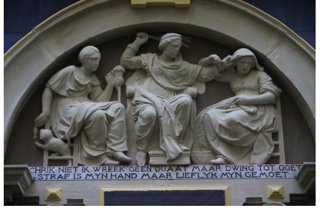
Epigraph of penal institution 'Rasphouse'
'Don't fear I don't revenge evil but force to well,
firm is my hand, but amiable my soul'
Coomherts philosophy of nature
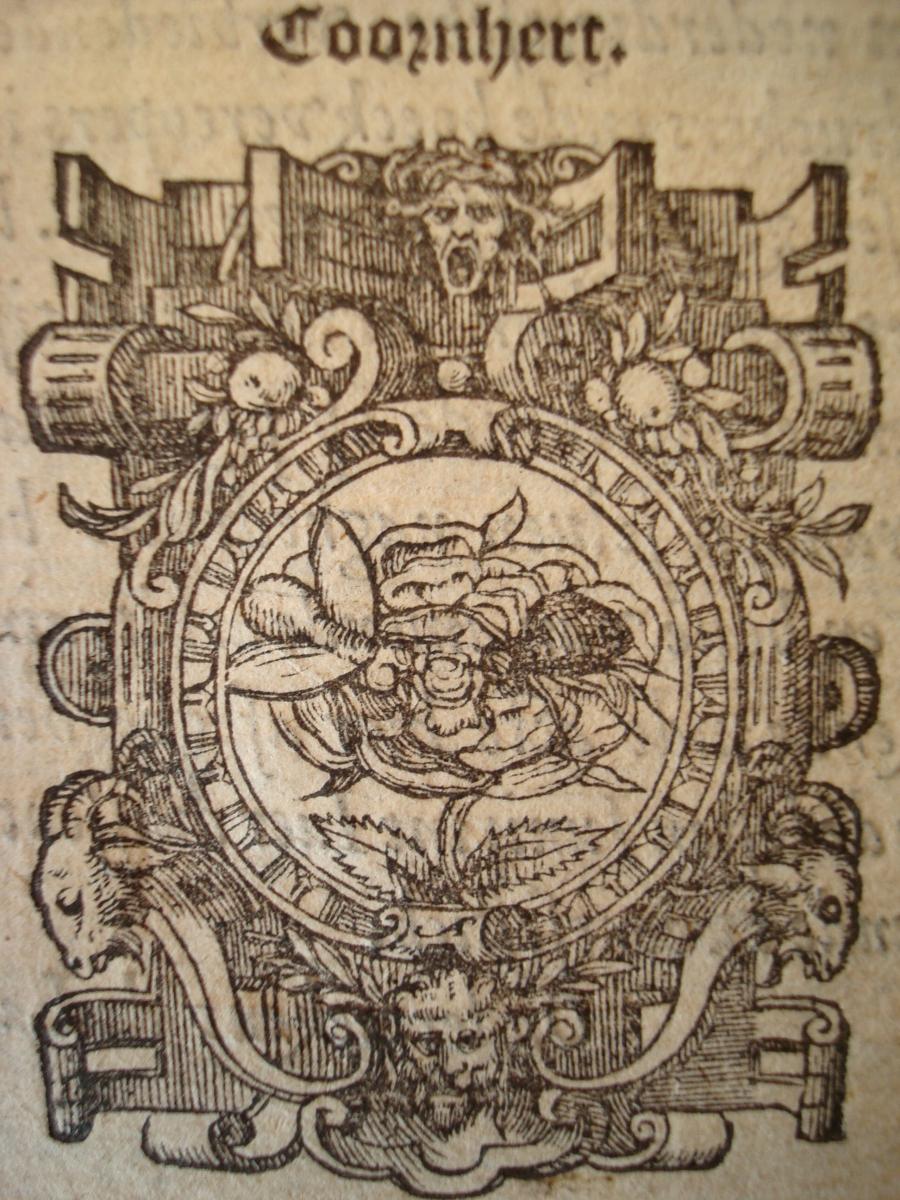
ILLUSTRATION OF COORNHERT ROSE WITH BEE AND POISONSPIDER
- (left) Coornhert illustrates his translation of Cicero's' s with a rose which attracts bees and poisonspiders
-Coomhert wrote an Ethics (without God)
- He wrote a book about 'highest good'
- Tried to show that original sin is not in the Bible. To this end he collected themes from the Bible and learned Latin: start of Bible analysis.
- 'Tyranny evokes violence not freedom'.
Perfectibility in Coornhert and Spinoza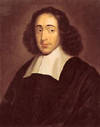
In many respects one can see in Coornhert a predecessor of Spinoza, living more then a century before him. The idea of the perfectibility one finds in Ethics IV Appendix,chapter IV.
"In life, it is of first importance to perfect understanding and reasoning as much as possible and this is one's highest happiness or blessedness of humans' (Spinoza, Eth IV, app, ch. IV)

